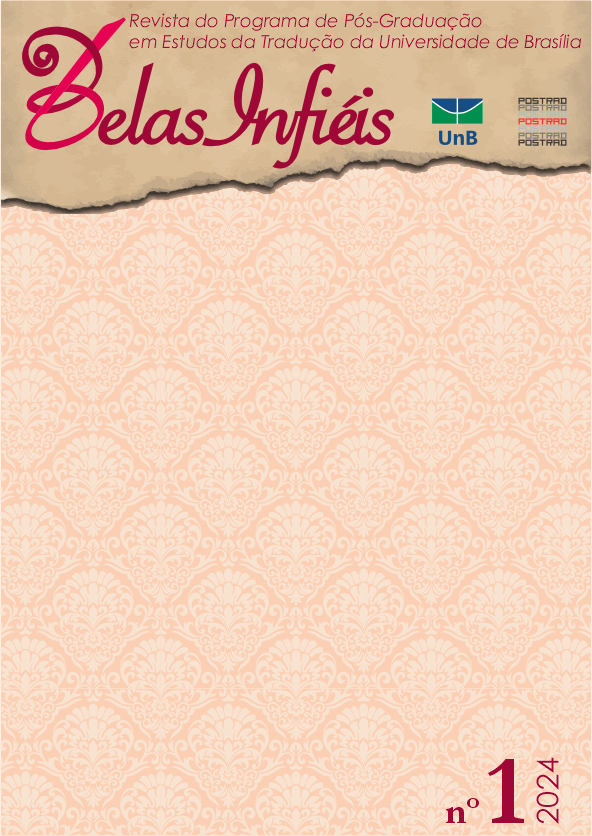Resenha de Poemas Selecionados (2021), de Emily Brontë
DOI :
https://doi.org/10.26512/belasinfieis.v13.n1.2024.53151Mots-clés :
Estudos da Tradução. Tradução poética. Poesia brontëana. Literatura inglesa. Literatura produzida por mulheres.Résumé
Esta resenha versa sobre a coletânea Poemas Selecionados (2021), publicada pela editora Caravana, com tradução de Rogério Sáber. O recorte dos textos presentes no livro focaliza e compreende os poemas de Emily Brontë em sua carga filosófica, aspecto recorrente em seus textos. Além disso, a escolha da edição da qual os poemas foram extraídos demonstra preocupação em trazer uma tradução a partir de um conteúdo atualizado. O trabalho empreendido nessa tradução parece ter optado por não se afastar muito dos poemas de partida. As traduções, apesar de não reproduzirem as rimas alternadas e a métrica por vezes regular — elementos comuns nos textos da poeta, destacam a sonoridade através do uso metafórico de aliterações e assonâncias para representar elementos citados nos poemas. No campo lexical, prioriza-se a semântica abundante no uso de metáforas e anáforas, além da preferência pelo léxico melancólico e sombrio, algo recorrente na poesia brontëana.
Références
Arrojo, R. (1993). A que são fiéis tradutores e críticos de tradução? Paulo Vizioli e Nelson Ascher discutem John Donne. In R. Arrojo, Tradução, desconstrução e psicanálise. Imago.
Barroso, I. (2015). Da curiosidade à tradução como ofício. Suplemento Literário.
Brontë, E. (2021). Poemas selecionados (R. Sáber, Trad.). Caravana. 83 p.
Brontë, E. (2016). O vento da noite (L. Cardoso, Trad.). Civilização Brasileira.
Brontë, E. (2003). O Morro dos Ventos Uivantes (R. M. P. Cordeiro & E. G. Silveira, Trads.). Landy.
Brontë, C, Brontë, E., & Brontë, A. (2014). Poemas escolhidos das irmãs Brontë (A. M. Chaves, Trad.). Lisboa: Relógio d’Água
.
Castro, O., & Spoturno, M. L. (2022). Feminismos e tradução: apontamentos conceituais e metodológicos para os estudos feministas transnacionais da tradução (M. B. F. Valdez & B. R. G. Barbosa, Trads.). Cadernos de Tradução, 42, 1–59, e81122.
Cordeiro, R. M. P. (2007). Especial Mulher. Seis poemas de Emily Brontë. Cadernos de Literatura em Tradução, 1, 161–172.
Dias, D. (jul./dez. 2012). Mulheres escritoras, cânone e poesia: Emily Brontë. Gênero na Amazônia, (2), 249.
Gezari, J. (1992). Emily Jane Brontë: The Complete Poems. Penguin Classics.
Oliveira, T. M. de. (2014). Yves Gambier, teórico da retradução: uma releitura de Antoine Berman. Rónai: Revista de Estudos Clássicos e Tradutórios, 2(1), 125–141.
Ribeiro, E. (2016). A nova edição de O vento da noite. Prefácio. In E. Brontë, O vento da noite (L. Cardoso, Trad.), p. 151. Civilização Brasileira.
Téléchargements
Publié
Numéro
Rubrique
Licence
© CC BY 2024

Cette œuvre est sous licence Creative Commons Attribution 4.0 International.
Copyright Statement
Given the public access to this journal, the texts are free to use but requires the recognition of the original authorship and initial publication in this journal to be properly stated.
The journal allows the use of works published for non-commercial purposes, including the right to submit the work to publicly accessible databases. Published contributions are the sole and exclusive responsibility of the author(s).
- When submitting papers to be evaluated by the Belas Infiéis journal, the author(s):
- Declare that the contents of the contributions are original and of their original creation, being entirely responsible for their content if there is an objection by third parties.
- Claim to be aware that they should not commit academic plagiarism.
- Declare that the manuscript has not been published, completely or partially, in Portuguese or another language. If it is a translation it should be submitted to the Translated Articles section.
- Declare that the manuscript is not being evaluated by other journals.
- Declare that the manuscript was not submitted to another journal simultaneously.
- Commit(s) to inform the journal of any kind of error or inaccuracy in their contribution (published, in evaluation or in editing) and to collaborate with the editors to make due corrections of the article (when in evaluation or editing) or erratum/retraction (after publication).
- Declare that there is no conflict of interest regarding the published work.
- Authorize its release if it is accepted for publication without any kind of monetary compensation.
- Agree to assign non-exclusive rights to publication to the magazine, remaining free to make their contribution available in other media as long as the publication of the first version in Belas Infiéis magazine is mentioned. They also authorize Belas Infiéis to assign their texts for reproduction in content indexers, virtual libraries and similar platforms.
- Maintain copyright and grant the journal the right of first publication, the work being licensed under theCreative Commons Attribution License.
- Is/Are allowed and encouraged to publish and distribute their work online after the editorial process, which may increase the impact and citation of the published work.
- Authorize the editorial team to make textual adjustments and to adapt the article to the publication rules, when necessary.



















